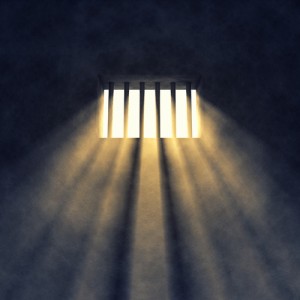Normally on a Monday morning we all wake pretty early, gather our belongings and head off to the next stop on the tour. Last Monday however, we stayed put in Valparaiso and purposely left most of our belongings behind, in order that we could clear security at Westville Correctional Facility. Though Westville is no more than a 20 minute drive from Valpo, I’m sure I’m not alone when I say that I feel we’ve all travelled a pretty long way this week.
Westville houses approximately 3,000 male prisoners in various blocks; it’s out on the edge of a small town, surrounded by Indiana’s flat countryside, which was battered this week by a pretty fierce wind. None of us really knew what to expect at Monday’s orientation, beyond the obvious strict security measures. We were keen to get a sense of what was expected of us and we were shown around by Rod, who, though he has worked at Westville for just two years, has worked within the US Prison system for nearly 20, and was perfectly placed to answer our questions. If there is a word which springs to mind when I think about my first impressions, it would be Uniform. Everything, from the landscape, to the inmates clothing, the walls, the security systems, and the prison routine, felt like it conformed to a sense of uniformity, which inevitably left me with a sense of feeling pretty conspicuous.
That afternoon, we gathered our ideas for the workshop sessions and formed a three hour plan which we delivered on Tuesday and Friday between 12 and 3. I think we were all anxious about how we would engage our audience with the exercises and with the story, especially over quite a long session. I was bowled over by the readiness and enthusiasm of the inmates to work with us, to explore ideas and text. We worked through exercises exploring communication, empathy, status, imagery, and story and spent the last part of the session looking at Shakespeare’s text, specifically Duke Senior’s speech which begins “Now my brothers and co-mates in exile…” and Jaques’ famous “All the world’s a stage” monologue.
I am currently reading John Steinbeck’s ‘Travels with Charley’, his account of trucking round the US in the early sixties with his French Poodle. About half way through the book they meet an actor who is similarly on the road and who talks to them about his work.
“I hope you won’t think I’m stealing material…I admire the delivery of Sir John Gielgud. I heard him do his monologue of Shakespeare – The Ages of Man. And then I bought a record of it to study. What he can do with words, with tones, and inflections! I tell about hearing Sir John, and what it did to me, and then I say I’m going to try to give an impression of how he did it….Shakespeare doesn’t need billing, and that way I’m not stealing his material. It’s like I’m celebrating him, which I do. I’m pretty much at home with it now, because I can watch the words sink in, and they forget about me and their eyes kind of turn inward and I’m not a freak to them anymore”
In one of those bizarre pieces of creative synchronicity, I read this passage the night before we went to deliver our first workshop and that’s exactly what seemed to happen as we all worked together. Shakespeare has a timeless power to articulate the human condition and define our experience. During the course of the workshop I stopped feeling so different and conspicuous and hopefully the inmates also escaped themselves for a moment too.
Performing the show in the chapel that night, we had no lighting, no stage, just a fiercely hot room and the sound of a loud sports game next door, but we could see our audience clearly; we could feel when they were with us and when they weren’t. Through the performance that night Arden took on a heightened meaning for me.
“Now go we in content, to liberty and not to banishment” says Celia, at the end of Act 1, Sc 3, and this is the springboard into the Forest. It’s this place of exile but also of transformation. Ultimately though, it’s a place of choice.
 Of course many of those working with us this week have made bad choices, but it is a powerful and transformative thing to offer a place of possibility and choice, even if just for a short time. One of the inmates described the experience as ‘a chink of sunlight in the gloom of incarceration’ and we were all incredibly proud and humbled by that.
Of course many of those working with us this week have made bad choices, but it is a powerful and transformative thing to offer a place of possibility and choice, even if just for a short time. One of the inmates described the experience as ‘a chink of sunlight in the gloom of incarceration’ and we were all incredibly proud and humbled by that.
“Everything can be taken from a man but one thing: the last of the human freedoms—to choose one’s attitude in any given set of circumstances, to choose one’s own way.”
— Viktor Frankl
